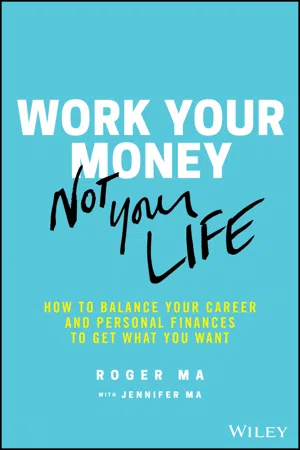
Work Your Money, Not Your Life
How to Balance Your Career and Personal Finances to Get What You Want
- English
- ePUB (mobile friendly)
- Available on iOS & Android
Work Your Money, Not Your Life
How to Balance Your Career and Personal Finances to Get What You Want
About This Book
Your all-in-one guide to getting your career and finances in order — for greater clarity, happiness, and peace of mind. Studies show that if you're like the majority of young professionals, you feel dissatisfied with your job, your finances, or your overall station in life. It can seem impossible to disentangle the work stuff, the money stuff, and the personal stuff, because they're all inextricably linked. But the good news is, you don't have to go at it alone: Work Your Money, Not Your Life is your all-in-one guide to achieving both your career and financial goals so that you can get where you want to be. In his debut book, Roger Ma, an award-winning financial planner and a publisher strategist at Google, offers secrets on how you can craft a meaningful career, gain financial comfort, and achieve a greater sense of purpose. And the premise behind it all is this: money affects every part of our lives. Simply by sorting out your personal finances (and it isn't as bad as it sounds!), you can build a foundation from which you'll be able to find the right career path, visualize your desired lifestyle, and turn your dreams into a reality. You'll learn how to:
- Relieve yourself of the work, money, and personal stressors that keep you up at night
- Dispel the job myths that are preventing you from a more rewarding career
- Apply the fundamentals of personal finance to your unique situation, without all the confusing jargon
- Prioritize and balance your career and money needs through exercises and easy-to-use templates, launching yourself on the path to the life satisfaction you desire
When the life you're living and the life you want to live don't match up, everything feels off balance. Where do you begin trying to connect the dots? Start with this book. Through accessible, practical advice, you'll learn the career and financial strategies you need to live the life you deserve.
Frequently asked questions
Information
Part I
Here's the Deal
Chapter 1
You're Worth More Than You Think
CreditCards.com poll.2 Career and money woes appear to be especially prevalent among young professionals. In fact, a LinkedIn survey found that 75% of people in their 20s and 30s had experienced “insecurity and doubt” around work and money (no duh, right?) — or what they might call a “quarter-life crisis.”3Net Worth Is Not the Be-All and End-All

Saving Money Is About More Than Just Retirement
Table of contents
- Cover
- Table of Contents
- Introduction
- Part I: Here's the Deal
- Part II: Figure Out Your Starting Point
- Part III: Optimize Your Job
- Part IV: Optimize Your Finances
- Part V: How to Stay the Course and Enjoy the Journey
- Conclusion
- Acknowledgments
- Index
- About the Authors
- End User License Agreement